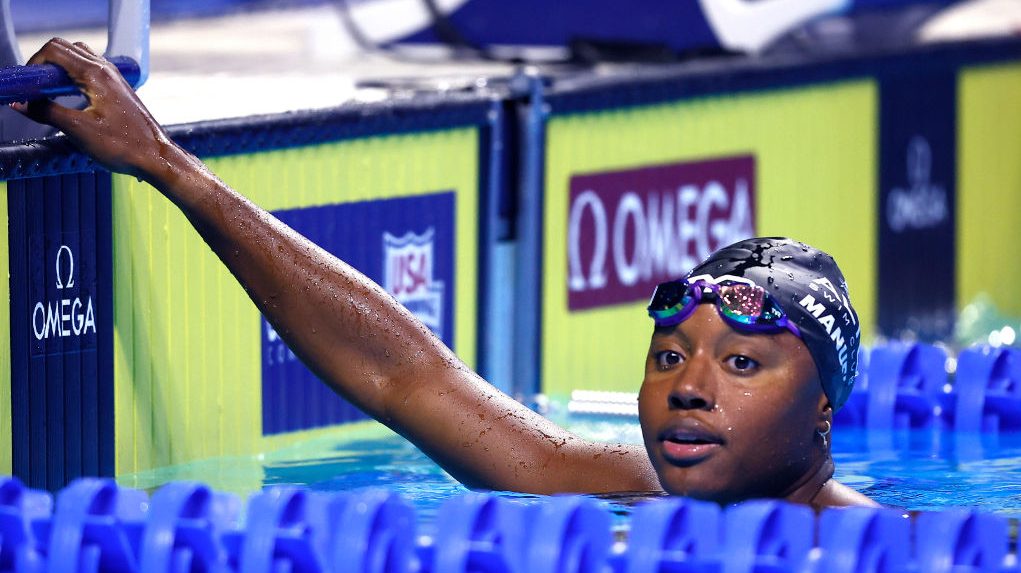Simone Manuel, after failing to make the Olympic Trials 100m freestyle final, revealed that she was diagnosed with overtraining syndrome in March, was out of the pool for three weeks until April 17 and dealt with depression, anxiety and insomnia.
“This was definitely my biggest fight,” Manuel said in a tearful but determined 24-minute press conference. “[Physically] it started a little bit in January. I think it was something that I didn’t quite notice until my body like completely crashed.”
Manuel, who tied for first in the Rio Olympic 100m free to become the first U.S. Black female swimmer to take individual gold, clocked 54.17 seconds in the semifinals of her first event of Trials in Omaha on Thursday night. She was the ninth-fastest swimmer, missing Friday’s eight-woman final by .02.
Her American record is 52.04 seconds from the 2019 World Championships, where she became the first woman to win seven medals at a single worlds.
Manuel has one more chance to make the Olympic team in the 50m free, with prelims and semis on Saturday and the final on Sunday. She is also the reigning world champion and American record holder in that event.
Manuel took peace knowing she did everything possible to perform at her best given the circumstances, persevering when there were times she wanted to give up.
“This was the first time I think I showed up to a meet, and before I even dove in to do a race, I was proud of myself,” she said. “I think that’s a big step. I hope that inspires more athletes to feel that way. I don’t think I’m alone in feeling that. I feel like we’re not proud of ourselves until we accomplish something so great, and I’ve done it. I’m an Olympic champion.”
SWIM TRIALS: Results | TV Schedule | Women’s Event Previews | Men’s Event Previews
Manuel said she felt “pretty bad” the week before a Pro Series meet in San Antonio that ran from March 3-6. The first symptom she had was an increased heart rate at rest and also during “simple sets” in training. That was followed by insomnia, depression, anxiety and sore muscles.
“Walking up the stairs to the pool, I was gassed,” she said.
Manuel won the 50m and 100m frees at the San Antonio meet. She then traveled to visit family in Houston, where she saw a doctor and was diagnosed.
She went back to her Stanford base and continued on a modified training regimen. Her overall performance declined over two weeks. After talking with doctors and coach Greg Meehan, she took three weeks out of the pool starting in late March. Manuel said she did not exercise during that time off.
“I went home, and I spent time with my family,” she said. “It was an uphill climb once I got back in the water. Some days were good. Some days weren’t great.”
Manuel elaborated on the mental effects.
“I isolated myself from my family,” she said. “My mom would ask me questions on the phone, and I would snap at her in times I typically wouldn’t. I had a hard time eating at times. I think the only way I got through it was talking to my loved ones and being surrounded by the support that they could give me, talking to my sports psychologist, openly talking to Greg and [coach] Tracy [Slusser] about what I was feeling after each practice or if I had a down day.”
Manuel swam at one more meet before the Olympic Trials, clocking 53.83 in a 100m free and 24.74 in a 50m free on May 20-21 in Texas. A 53.83 would have qualified fifth into Friday’s 100m free final. The 24.74 put her ninth in the U.S. rankings for the 50m free this year.
Then last Saturday, in a pre-Olympic Trials press conference, Manuel deemed herself ready to race.
“I think I didn’t want people to feel sorry for me,” she said Thursday in retrospect. “I still don’t want them to feel sorry for me now. I’m confident that the path that God has me on is the path that I’m supposed to be on.”
After Thursday’s swims, she said “things still feel hard.”
“My speed doesn’t seem to be there with the effort that I’m trying,” she said.
A doctor told her that, pending she makes the Olympic team, she needs to take two months off to let her body rest.
“I think I’ll be fine,” she said. “I think that I’ll continue to follow doctors’ orders and take it slow as I get back into the pool, whenever that happens.”
Manuel was asked, in the last question of the press conference, if the pandemic played a role in what she described in the previous 20 minutes. It could have, she said at first.
She elaborated, believing that two factors played into it: the mental challenge of having to train an extra year for a postponed Olympics and being a Black person in America.
“This last year for the Black community has been brutal, and I can’t say that that wasn’t something that I saw,” she said. “It’s not something I can ignore, and it was just another factor that can influence you, mentally, in a draining way. I think that those were two things that played into a little bit of the overtraining in some ways.”
Manuel expressed determination to race the 50m free, beginning Saturday morning.
“Maybe it didn’t happen today, but this isn’t the last time you’re going to see me,” she said, “and this isn’t the last time I’m going to do something great in the pool.”
OlympicTalk is on Apple News. Favorite us!
